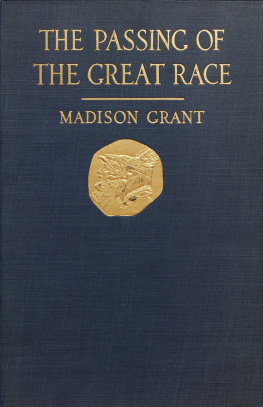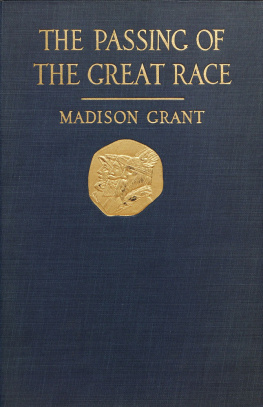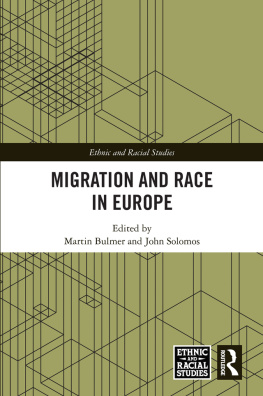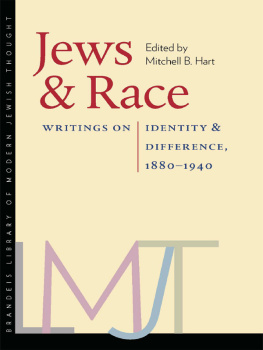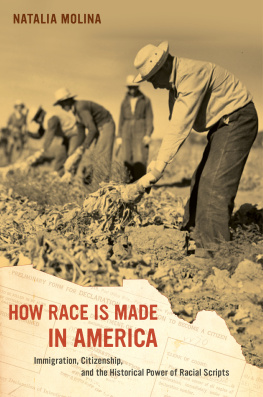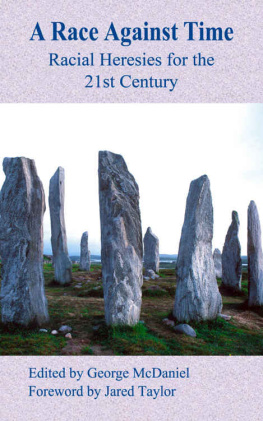
This book was quoted by both Sen. Bilbo in Take Your Choice: Seperation or Mongrelization and by Earnest Cox in White America . While some of Grant's material has been amended and updated in the years since 1916, it still serves as an important work in the study of racial origins.
TABLE OF CONTENTS
Part I - Race, Language, And Nationality
Part II - European Races In History
Introduction
THE following pages are devoted to an attempt to elucidate the meaning of history in terms of race; that is, by the physical and psychical characters of the inhabitants of Europe instead of by their political grouping, or by their spoken language. Practically all historians, while using the word race, have relied on tribal or national names as its sole definition. The ancients, like the moderns, in determining ethnical origin, did not look beyond a man's name, language, or country, and the actual information furnished by classic literature on the subject of physical characters is limited to a few scattered and often obscure remarks.
Modern anthropology has demonstrated that racial lines are not only absolutely independent of both national and linguistic groupings, but that in many cases these racial lines cut through them at sharp angles and correspond closely with the divisions of social cleavage. The great lesson of the science of race is the immutability of somatological or bodily characters, with which is closely associated the immutability of psychical predispositions and impulses. This continuity of inheritance has a most important bearing on the theory of democracy and still more upon that of socialism, and those, engaged in social uplift and in revolutionary movements are consequently usually very intolerant of the limitations imposed by heredity.
Democratic theories of government in their modern form are based on dogmas of equality formulated some hundred and fifty years ago, and rest upon the assumption that environment and not heredity is the controlling factor in human development. Philanthropy and noble purpose dictated the doctrine expressed in the Declaration of Independence, the document which today constitutes the actual basis of American institutions. The men who wrote the words, "we hold these truths to be self-evident, that all men are created equal," were themselves the owners of slaves, and despised Indians as something less than human. Equality in their minds meant merely that they were just as good Englishmen as their brothers across the sea.
The words "that all men are created equal" have since been subtly falsified by adding the word "free," although no such expression is found in the original document, and the teachings based on these altered words in the American public schools of today would startle and amaze the men who formulated the Declaration.
The laws of nature operate with the same relentless and unchanging force in human affairs as in the phenomena of inanimate nature, and the basis of the government of man is now and always has been, and always will be, force and not sentiment, a truth demonstrated anew by the present world conflagration.
It will be necessary for the reader to strip his mind of all preconceptions as to race, since modern anthropology, when applied to history, involves an entire change of definition. We must, first of all, realize that race pure and simple, the physical and psychical structure of man, is something entirely distinct from either nationality or language, and that race lies today at the base of all the phenomena of modern society, just as it has done throughout the unrecorded eons of the past.
The antiquity of existing European populations, viewed in the light thrown upon their origins by the discoveries of the last few decades, enables us to carry back history and prehistory into periods so remote that the classic world is but of yesterday. The living peoples of Europe consist of layer after layer of diverse racial elements in varying proportions, and historians and anthropologists, while studying these populations, have been concerned chiefly with the recent strata, and have neglected the more ancient and submerged types.
Aboriginal populations from time immemorial have been again and again swamped under floods of newcomers and have disappeared for a time from historic view. In the course of centuries, however, these primitive elements have slowly reasserted their physical type and have gradually bred out their conquerors, so that the racial history of Europe has been in the past, and is today a story of the repression and resurgence of ancient races.
Invasions of new races have ordinarily arrived in successive waves, the earlier ones being quickly absorbed by the conquered, while the later arrivals usually maintain longer the purity of their type. Consequently the more recent elements are found in a less mixed state than the older, and the more primitive strata of the population always contain physical traits derived from still more ancient predecessors.
Man has inhabited Europe in some form or other for hundreds of thousands of years, and during all this lapse of time the population has been as dense as the food supply permitted. Tribes in the hunting stage are necessarily of small size, no matter how abundant the game, and in the Paleolithic period man probably existed only in specially favorable localities, and in relatively small communities.
In the Neolithic and Bronze periods domesticated animals and the knowledge of agriculture, although of primitive character, afforded an enlarged food supply, and the population in consequence greatly increased. The lake dwellers of the Neolithic were, for example, relatively numerous. With the clearing of the forests and the draining of the swamps during the Middle Ages and, above all, with the industrial expansion of the last century, the population multiplied with great rapidity. We can, of course, form little or no estimate of the numbers of the Paleolithic population of Europe, and not much more of those of Neolithic times, but even the latter must have been very small in comparison with the census of today.
Some conception of the growth of population in recent times may be based on the increase in England. It has been computed that Saxon England at the time of the Conquest contained about 1,500,000 inhabitants; at the time of Queen Elizabeth the population was about 4,000,000, while in 1911 the census gave for the same area some 35,000,000.
The immense range of the subject of race in connection with history from its nebulous dawn, and the limitations of space, require that generalizations must often be stated without mention of exceptions. These sweeping statements may even appear to be too bold, but they rest, to the best of the writer's belief, upon solid foundations of facts, or else are legitimate conclusions from evidence now in hand. In a science as recent as modern anthropology, new facts are constantly revealed and require the modification of existing hypotheses. The more the subject is studied the more provisional even the best sustained theory appears, but modern research opens a vista of vast interest and significance to man, now that we have discarded the shackles of former false viewpoints and are able to discern, even though dimly, the solution of many of the problems of race. New data will in the future inevitably expand, and perhaps change our ideas, but such facts as are now in hand, and the conclusions based thereupon, are provisionally set forth in the following chapters, and necessarily often in a dogmatic form.
The statements relating to time have presented the greatest difficulty, as the authorities differ widely, but the dates have been fixed with extreme conservatism and the writer believes that whatever changes in them are hereafter required by further investigation and study, will result in pushing them back and not forward in prehistory. The dates given in the chapter of "Paleolithic Man" are frankly taken from the most recent authority on this subject, "The Men of the Old Stone Age," by Professor Henry Fairfield Osborn, and the writer desires to take this opportunity to acknowledge his great indebtedness to this source of information, as well as to Mr. M. Taylor Pyne and to Mr. Charles Stewart Davison for their assistance and many helpful suggestions.
Next page
